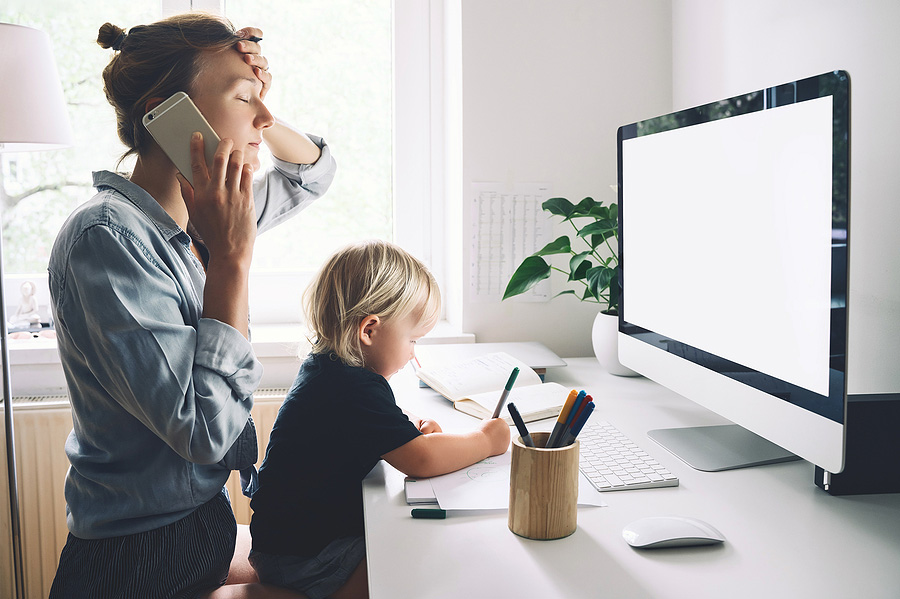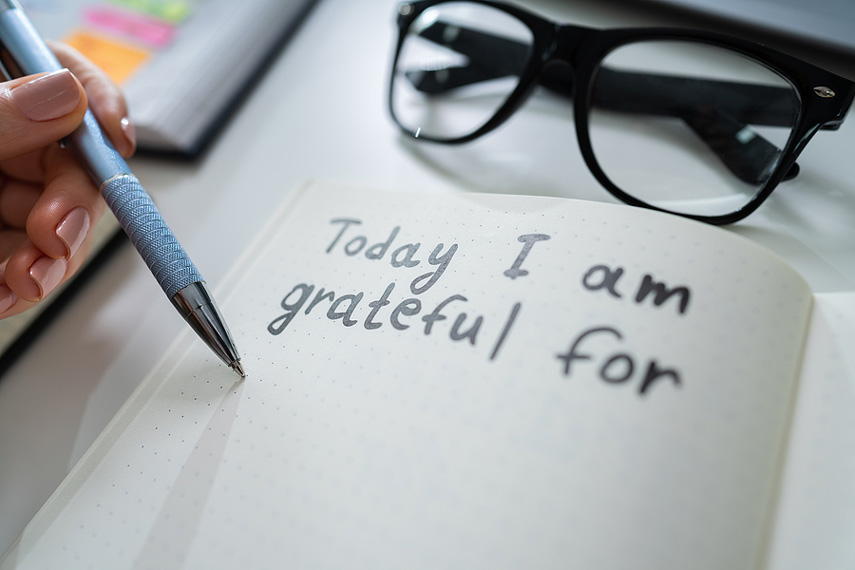Every day, I come across inspiring quotes about living in the present. These really resonate with me and when I share them on social media, I recognize how they touch others by the number of times they’re shared. There’s a reason these quotes speak to us; we know in our hearts that the path to happiness lies in accepting what is, in noticing and being grateful for what we can do right now. But still, it’s so hard to really notice and appreciate each moment we have, isn’t it?
Sometimes, we get so caught up in expectations and commitments that we forget to pay attention. When I tell women it’s time to slow down and enjoy their surroundings, they often agree, but then present reason after reason why they can’t. They’re moving through their days on auto-pilot, mentally tracking what they have to do later, checking items off their endless to-do lists. So many of the women I have met tell me they find it nearly impossible to notice what is happening in any given moment without letting other thoughts, anxieties and judgment creep in. So if you find that happening to you, rest assured you aren’t alone!
During the holidays it’s more difficult than ever to focus on the present. Our minds are racing with tasks to complete – shopping, wrapping, cooking and cleaning the house for guests. And that’s on top of our regular hectic schedules. But taking time to clear your mind and notice what’s happening in one specific moment (or better yet, ten or fifteen minutes a day) – is a great way to reduce stress and help keep you healthy!
What Does It Mean to Be Mindful?
People often equate mindfulness with meditation, but there’s actually a big difference. Meditation is a tool to help you live life in the present. Mindfulness is being aware of the present moment without judging. True mindfulness means living life in the present moment, and no other.
Sounds simple, right? I wish it were! Unfortunately, all too often, especially during busy times like the holiday season, people walk around doing things without any thought or awareness at all. And when they do notice what they’re doing, negative judgements take over, creating all kinds of stress and reaction in their bodies.
Here’s an example of how that happens: You are at a holiday party crowded with strangers. You find yourself standing next to the buffet table, and reach out to sample the treats repeatedly, without even really tasting the food you’re eating. When it dawns on you that you’ve eaten more than you usually eat for dinner, the voice in your head begins. Why did I do that? I’ll never lose weight. People must think I’m a pig, standing here eating constantly…and on and on.
And it doesn’t just happen around food. Do you find yourself running from store to store, frantically buying things to check off names on your gift list, only to get home and wonder what you were thinking? Do you end up with things in your bags that you don’t even know who you bought them for?
Noticing what you are doing when you are doing it, really savoring each experience, and making conscious choices about what you are doing are all mindful ways of living. That means really paying attention to all of your senses. What are you seeing, smelling, and hearing? How does your body feel? What emotions are coming up during the experience?
When you are mindful, you aren’t multitasking. All of your focus is on the details – the warmth of the sun on your face, the wind in your hair, the tears running down your cheeks, the bite of food you are eating. You’re noticing – but not judging – each action, sensation, or emotion.
Can you imagine living for even just a few moments without judgment? Without worrying about what is coming next or what happened before? A wonderful quote from Jon Kabat-Zinn, founder of Mindfulness-based stress reduction (MSBR) says it well. “Mindfulness is about being fully awake in our lives. It is about perceiving the exquisite vividness of each moment. We also gain immediate access to our own powerful inner resources for insight, transformation, and healing.”
How Can Mindfulness Impact Stress?
I have talked a lot about stress in recent newsletters. You might wonder why I keep bringing it up, but I think the evidence of the impact that stress has on health speaks for itself. You can read more about what stress does to your body, especially to adrenal health, in my health library.
There’s a wide body of research that shows promising results for mindfulness based stress reduction (MBSR). A 2015 meta-analysis of research conducted through 2014 concluded that MBSR had an effect on many aspects of well-being, and a large effect specifically on stress.
Since stress reduction is something so many women struggle with, this information excites me. Why? Because it backs up something I’ve believed for years: mindfulness matters. Simply noticing what’s going on for you can actually change your stress levels. That means that anyone can do it. You don’t need special equipment. It won’t cost you anything. And it just might leave you feeling happier and much more in control of your own life. What a powerful tool!
I often remind my patients that they can’t control what other people do, and often they have little control over stressful events in their lives. What they can control is their own reactions. Mindfulness helps you notice how you are feeling, and gives you a little time to consider how to respond. Once you get used to paying attention, it can become second nature. And you can practice mindfulness anywhere. Let’s look at a few ways that you can begin incorporating mindfulness into your life – right now!
5 Easy Ways to Practice Being Mindful Today
You already have the ability within yourself to transform your life. But it’s not easy, so I’m here to help. The holiday season is a great time to learn how to let go of past regrets or worries about the future, but with all the extra stress it brings, it can also be the hardest time to figure this out.
Holidays often mean spending time with family, and there may be many unresolved issues that come crashing into the forefront. Or perhaps you have no family and the loneliness is hard to hold at bay. Or maybe you love all the time together, but are stressed trying to fit all the activities in – especially if you have in-laws to see too!
Learning some techniques for staying mindful can keep you balanced and aware of exactly what is happening for you, both physically and mentally. And knowing what is going on is the first step in staying ahead of the issues that might hold you back. Here are five tips to build mindfulness in your life, no matter how much or how little time you have.
1. Meditate
Meditation is what most people immediately think of when I mention being mindful. And there’s good reason for that – there’s a wealth of scientific evidence that shows that mindfulness meditation has tremendous benefits, including stress relief, pain reduction, lowering blood pressure, higher sleep quality, relief from hot flashes, and much more. One study in 2016 even showed that mindfulness meditation can actually change the brain. There are plenty of resources out there to help you start mindful meditation practice. Try a community based course that teaches mindfulness meditation methods, buy a book, or look up techniques online to get started.
2. Clear Your Mind
I am a big fan of journaling, because it’s a great way to clear your head. Our minds can become so crowded with worries, to-do lists, shopping ideas, recipes and more that it’s nearly impossible to focus on any one moment. Writing it all down can clear the space you need to notice the moments you are living in.
Set aside five to ten minutes to write down anything that pops into your head. When you’re done, sort into priorities to see if these things are truly important to you, or if you can let them go. Put any pressing “must-do” items in your calendar or on a to-do list and you can stop worrying that you might forget. And ask yourself if each thing you think you “should” do really warrants the time or effort it will take. If not, cross it off!
3. Plan Worry Time – But Just a Little
When I tell patients to schedule their worry time, they don’t believe it will work. But after they try it, they tell me it lifts the frustration they feel when they can’t stop themselves from worrying. We all have those things that take root in our minds and just won’t let go. So give yourself permission to think about it — but only for a few minutes. Schedule the time into your calendar like any other appointment. And when the allotted time is up, it’s time to move on to things you can actually control.
4. Savor the Journey
Have you ever arrived somewhere and realized you remember nothing about the drive? Just the other day a friend told me this happened to her – she got on the highway going the wrong direction, and didn’t realize it until three exits later! When you get in the car, don’t allow yourself to function on auto pilot. Make a point to focus on exactly what you see as you travel. You might even notice something you’ve never seen before, despite driving the same route every day. Try this when you travel by bus, plane or train too — you’ll be amazed at what you notice when you are tuned in to the journey.
5. Begin and End Your Day with Mindfulness
There are two key moments in the day where mindfulness can make a big difference. The first is right when you wake up, before you’re caught up in the crazy pace of your day. Sit with coffee or tea and nothing else. The paper, your email, Facebook status, or schedule for the day can wait. Enjoying a few minutes of quiet, and really noticing how you feel can set the tone for the whole day. The second moment is the very end of the day, right before you fall asleep. Take a few minutes to notice your breathing and how your body feels as you lie in bed. Focusing in on these things instead of what you have to do the next day might even help you fall asleep more quickly.
Choose to Be Mindful and Feel Stress Slip Away!
Like anything worth learning, mindfulness takes consistent practice. The beauty is that being mindful is all about the moment, so it doesn’t matter how long you have. Be aware of all your senses as you wait in traffic, brush your teeth, or take a bite of food.
Once you’re good at noticing the details, you can take it a step farther, and consciously choose reactions to situations that come up. You can’t do that if you don’t even know what’s really happening! Mindfulness won’t make the stressors in our life disappear, but it may well be the key to learning to cope with these factors in healthy ways. And less stress means better health. Give yourself the same time you give others, and you’ll find yourself smiling more and stressing less! What a gift that will be this holiday season! As a Shaman teacher once told me when I was in Peru at Machu Picchu… “Watch the Movie, don’t react, be present!!”







